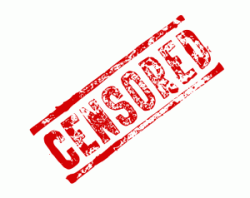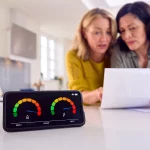UPDATE MP Claire Perry Claims UK ISP Internet Filters Will Not Overblock

One of the UK Government’s strongest advocates of mandatory network-level Internet filtering, MP Claire Perry, has told a Westminster eForum that modern ISP censorship systems are “far better, far stronger, much more effective and will not overblock” websites (i.e. wrongful blocking). Even though they do.. quite a lot.
Perry was quick to dismiss all of the recent and historic reports about overblocking as “fanciful” and suggested that they merely represented “anecdotal evidence” of a problem that she appears to believe no longer exists.
Advertisement
But this rather ignores that Sky Broadband incorrectly blocked the jQuery CDN site earlier this week (here), not to mention TorrentFreak before that (here), Imgur too (here) and the large number of help and education sites that other ISPs and mobile operators have similarly placed wrongful blocks upon (here, here, here oh and here).
Filtering technology has always been inherently unreliable, much like those anti-spam filters that often trap legitimate email messages in your junk folder, and ISPs are often the first to admit that they’re not a silver bullet for the problem and should not be seen as a substitute for good supervision by parents. Incorrect content categorisation, system errors, filtering out shared IP addresses and so forth are all examples of common issues.
The remarks came shortly after Baroness Howe of Idlicote once again attempted to force a new amendment (53ZAAB) into the Children and Families Bill, which would have required all ISPs (including smaller providers) to introduce Parental Controls that could “exclude adult content” (here).
Howe’s move came despite the fact that the voluntary system with big ISPs has only just been formally introduced and is yet to even be fully implemented (i.e. existing subscribers have yet to be given the “enforced” choice about whether or not to enable the filters, except on TalkTalk that is).
Advertisement
Baroness Howe said:
“In embarking on this debate, I should like to put on the record my thanks to the Prime Minister for the progress he has made in enhancing child safety online on a self-regulatory basis through the code of practice being implemented by the big four internet service providers.
However, I also want to argue that, while welcome as a first step, self-regulation will not be anything other than a short-term solution and that regulation should now be placed on a robust statutory footing.
In a previous debate, the noble and learned Lord, Lord Mackay of Clashfern, set out the very important principle that if child protection is sufficiently important to merit statutory protection offline, the same must be true online.”
During the debate Howe received a good level of support from others including Baroness Benjamin (Liberal Democrat), Lord Harris of Haringey (Labour), The Earl of Listowel, Lord Hope of Craighead (Judge) and more. Funnily enough even broadband provider AAISP, whose boss (Adrian Kennard) has been outspoken in opposition of censorship, later got a mention.
Baroness Howe added:
“Self-regulation, for example, provides no means of dealing with the likes of Andrews and Arnold [AAISP] where default filters are concerned. Its closed loop system does not provide for proper age verification and the mobile phone code all too often — and at very real cost to children — has not been respected. If we believe that child protection is really important—and I have every belief that your Lordships believe just that — we must introduce robust statutory measures to help prevent children accessing this material.
Andrews and Arnold has publically stated that it will not introduce default filters. Its home page proudly proclaims, “Unfiltered internet for all”—including, presumably, for all children. Clearly it has no intention of introducing default filters, and will do so only if required by law. If we had a statutory approach to default filters, as set out in my amendment, all ISPs, including all those that service the remaining 5% to 10% not covered by the big four code, would have to introduce default filters.“
However others, such as Lord Lucas (Conservative), warned that the proposed measures asked “ISPs to do something that is impossible“, before later pointing to the ease of circumvention (one in five children aged 12-15 can already get around them).
Baroness Northover (Liberal Democrat) also echoed some earlier remarks by Lord Stevenson in which he said that the idea, “needs more thinking … to make it fit for purpose and to guard against unintended consequences“. Indeed filters are often a bit like putting up a “keep out” sign on your bedroom, while still leaving the door wide open.
Adrian Kennard, Director of ISP Andrews & Arnold, said:
“All the current ISP porn blocks do is give parents the false impression that the Internet is now “safe”, meaning they supervise children less. I do think the Baroness needs to think a little more on exactly what she is asking for here, and why.”
It’s also notable that the issue of cost, which is a significant problem for smaller ISPs that might wish to implement such a service but often struggle to compete against the economics of scale enjoyed by the largest providers, wasn’t even discussed during the debate. In the end Howe’s amendment did not pass.
Advertisement
Meanwhile Claire Perry, after initially saying that filters “will not overblock“, has today told PC Pro that “there will be errors” with such systems and that the government has recently setup “a working group on overblocking, where we’re trying to facilitate a process whereby site owners can understand what the status is. That’s only just started, and we will get better at that“. No working group will be able to solve the technical limits of such systems but they might help to clear up bad categorisation and speed the process of having wrongful blocks removed.
Separate to this debate, it’s worth noting that an appeal court in the Netherlands has today removed a ban that instructed the country’s ISPs to block access to The Pirate Bay website over copyright infringement. Virgin Media are understood to be studying this ruling but we don’t expect it to have any real impact on UK law, where we have a separate court ordered principal established under Section 97A of the Copyright, Designs and Patents Act.
As it stands the big UK ISPs have effectively agreed to sit back and adopt the court orders as they arrive and would perhaps not be keen to challenge them. The cost of doing so, combined with the risk of being perceived as piracy’s defenders, might cause too much of an issue. But even if any of the ISPs did want to go down that path then no doubt they’d rather wait to see if Dutch rights holders choose to challenge the ruling first.
UPDATE 31st January 2014
It’s understood that the working group, which was alluded to by Claire Perry above, might also produce a white list of websites to prevent them being blocked. The BBC report suggests that this would apply to sites that have been accidentally caught up in the filters (e.g. TorrentFreak), although it doesn’t really solve the underlying problem.
Curiously the chair of this group, David Miles (UK Council for Child Internet Safety), claims to have visited several charities to find out how the introduction of web-based filters
for adult content had hit visitor numbers.
But it’s unclear whether any of the charities he visited had even been impacted and, speaking as a website owner myself, it’s not always immediately clear unless your readers point it out first. Apparently charities might also be added to the whitelist.
Mark is a professional technology writer, IT consultant and computer engineer from Dorset (England), he also founded ISPreview in 1999 and enjoys analysing the latest telecoms and broadband developments. Find me on X (Twitter), Mastodon, Facebook, BlueSky, Threads.net and Linkedin.
« East Sussex UK Name Phase 2 BDUK and BT Fibre Broadband Rollout Areas






















































Comments are closed